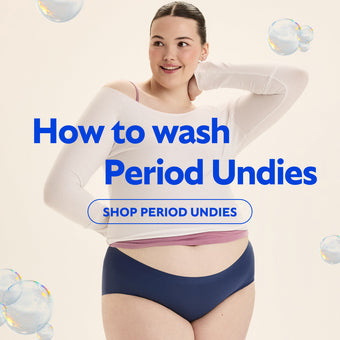You’re probably already familiar with terms like “shark week” or “Aunt Flo,” but did you know that phrases like “mad cow disease,” “Having the painters in,” and “Granny’s Stuck in Traffic” are all slang for having a period as well? For as long as people have been getting periods – which is to say, the beginning of time – they have been coming up with ever-more creative ways of referring to them. Here’s an explainer on why period euphemisms are so popular and why you should consider putting them to rest when talking to your kids about periods.
Where does the word period come from?
The word period is rooted in the Greek words “peri” and “hodos,” which translates to “around” and “way/path.” This eventually transitioned into the Latin word “periodus,” meaning “recurring cycle.” Interestingly, the English word we all know, period, wasn’t actually used until about the early 1800s as a term to describe a person’s menstrual cycle.
Further reading: How to insert a tampon
The History of Period Euphemisms
The euphemisms used to describe your period go even further back than the 19th century. In the 17th century, both those who experienced periods and those who didn’t described menstruation by referring to a period cycle as “them” or “those.” This is because periods have always been a taboo subject throughout history, and most people who get them don’t feel like they’re able to talk openly about the struggles – and joys! – of menstruation. You have probably felt a bit of this too, if you or your teen has ever hid a tampon in your sleeve while on your way to the bathroom, or had a small red spot on your pants and prayed nobody notices.
Why Use the Word Period Instead of Slang Terms
Periods are natural, normal, and healthy, and we shouldn’t be afraid to refer to them by their proper name or need to hide behind slang terms. The more we talk openly about periods, the less we'll feel alone in our experiences, and the better chances we'll have for proper reproductive education and care. It also means we'll be able to advocate for ourselves well with medical professionals by using real biological and anatomical terms. Period equity begins with open dialogue and comfort in talking about natural biological processes.
Still figuring out how to be comfortable with talking about periods? We have a guide for that.
Period Euphemisms from Around the World
Here’s a list of some of the most common – and ridiculous – period slang and euphemisms from all over the world. Which outdated term is your favorite? What do you think is the meaning behind them?
- Blue day (Japan)
- Crimson wave/tide (Australia and New Zealand)
- Strawberry week (Austria, Hungary, Latvia, Norway, and Switzerland)
- Checking into the Red Roof Inn (USA)
- Red wedding (USA)
- Tomato juice (Germany)
- The carrots are cooked (France)
- The little clown with a nose bleeding (France)
- Red Sea (Italy)
- Defrosting the steak (Spain)
- Emma (Germany)
- The English Have Landed (France, Belgium, and Canada)
- I’m With Chico (Brazil)
- There Are Communists in the Funhouse (Denmark, Estonia, Canada, and Sweden)
- I’m With Andrew. The One That Comes Every Month (Central and South America)
- Little sister has come (China)
- The cranberry woman is coming (Germany)
- Birthing a blood diamond (Unknown)
- The Red Badge of Courage (USA)
- Red Wedding (USA)
- Girl Flu (Unknown)
The Final Word on Period Slang
We spend a lot of time on our period. That's why it's so important we're able to talk about it openly, to both feel comfortable in our skin and also get the support we need for navigating it, through education and open dialogue. We may not mean anything bad when we say "Aunt Flow is in town" or declare we're "riding the crimson wave" -- and it's okay to joke! -- but we should also feel secure in using real anatomical words and saying 'period' and 'menstrual cycle.' Doing so means we're ready to advocate for ourselves, whether it's at the school nurse or the doctor's office.








